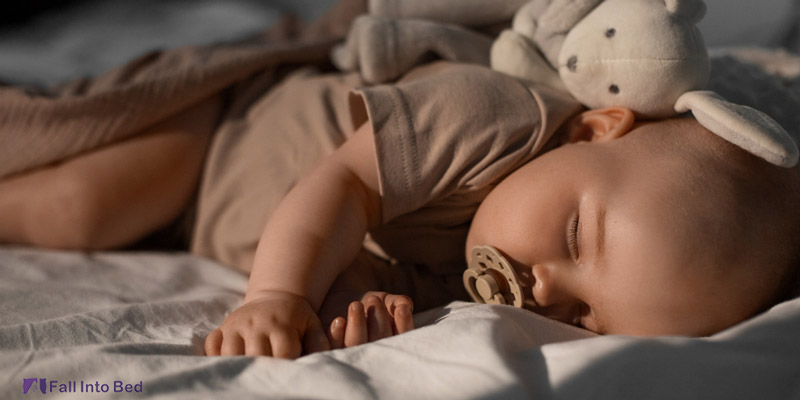Figuring out a good sleep schedule for your 9-month-old can be pretty difficult. Especially since a lot of things can affect their sleep, like different milestones and sleep regression. In this article we are going to offer a sleep schedule for your little one and talk about important factors.
How much sleep does a 9 month old need?
A typical 9 month old baby should sleep for 12-15 hours per day. This can split in to a 11-12 hour sleep during the night and a 2-3 hour nap during the day.
Usually we can split the naps into two parts. One before noon and one in the afternoon, since most babies at this age can have a 3-3.5 hour wake window between their sleep.

How many naps should a 9 month old take?
A 9-month-old baby’s sleep schedule typically has two naps a day. One in the morning and one in the afternoon. This schedule helps them maintain a balanced amount of sleep and a good sleep cycle, with their naps usually totalling around 2 to 4 hours during the day.
As babies approach their first birthday, they often stick to this two-nap routine before eventually transitioning to one nap a day closer to 12 to 18 months. Check out the best positions to put your baby to sleep in, especially during the first year of their life.
9 month old sleep schedule
| TIME | ACTIVITY |
|---|---|
| 6:30 a.m. | Wake time |
| 9:30 – 11 a.m. | Nap 1 ( 3hrs of wake window before the first nap) |
| 2:15 – 3:45 p.m. | Nap 2 ( 3hrs 15m of wake window before the second nap) |
| 7 p.m. | Bedtime 💤 |
What are some 9 month old milestones?
At 9 months, babies are hitting some pretty exciting milestones which can affect their sleep patterns!
Many are starting to crawl or scoot around, and some might even pull themselves up to stand, holding onto furniture for support. Their fine motor skills are improving too, with many beginning to use a “pincer grasp” to pick up small objects, like bits of food.
Teething is another common milestone for 9-month-olds. Many babies start getting their first teeth around this age, often the front bottom or top teeth. You might notice more drooling, chewing, and some fussiness as those teeth come in.

You’ll also hear lots of babbling at this stage, with sounds like “mamama” and “dadada” becoming more common, though they may not yet be linked to specific people.
Separation anxiety often kicks in around this age, meaning they may show some nervousness when separated from caregivers. Socially, they’re starting to respond to their name, understand simple words like “no,” and may even wave or clap in response to excitement.
It’s a period of exploration and learning, as they eagerly reach for and interact with everything around them, testing out their growing skills. Every baby develops at their own pace, so these milestones can vary slightly from one child to another.
Is there a sleep regression at 9 months?
The 9-month-old sleep regression happens when a healthy baby with a normal sleep schedule suddenly starts waking up at night, has trouble falling back to sleep, and experiences changes in their sleep cycle.
Sleep regressions can occur at almost any age, up until 24 months, with the most common times being around 2, 4, 8, 12, and 24 months. It’s also normal to see regressions around 14, 15, and 16 months.
Even though it can feel like this phase will never end, it usually resolves after a few weeks. During this time, maintaining a consistent sleep routine for your baby is key to helping them get through it.

FAQs about 9 month old sleep schedule
1. How much sleep does a 9-month-old need?
On average, a 9-month-old needs about 12 to 16 hours of sleep in a 24-hour period. This includes night-time sleep (around 10-12 hours) and naps (2-4 hours).
2. How can I manage night wakings?
Stick to a consistent bedtime routine and avoid stimulating activities close to bedtime. If night wakings happen, keep the environment calm and quiet to help them settle back down. You can also use tricks to put your baby to sleep in less than a minute.
3. What time should a 9-month-old go to bed?
A good bedtime for a 9-month-old is between 7:00 and 8:00 PM, as this helps them get a solid stretch of night-time sleep.








